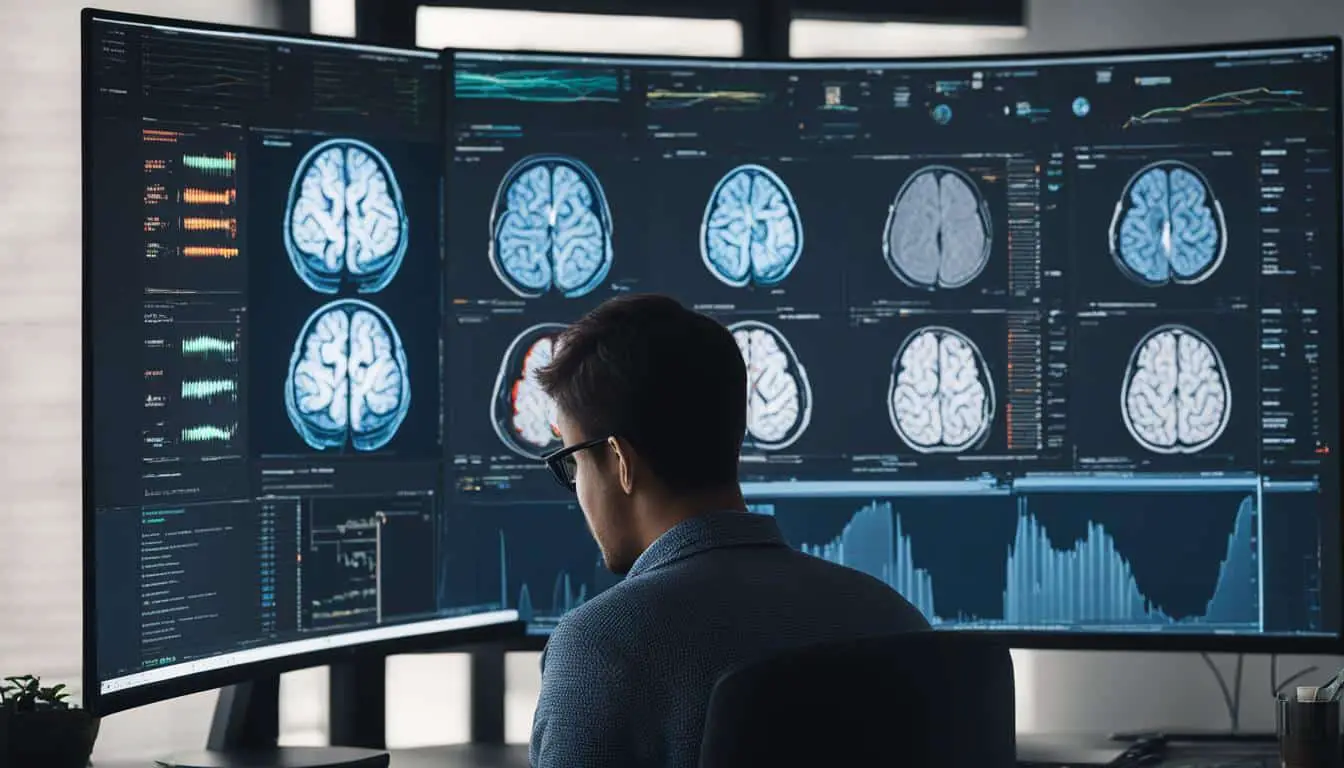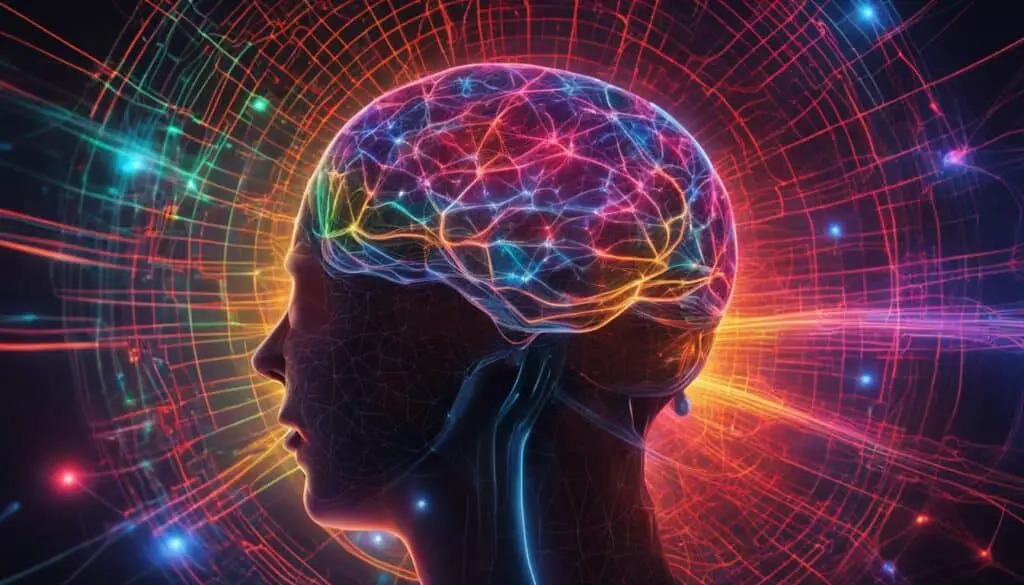
Over the past decade, AI has revolutionized various fields, and its impact in healthcare has been particularly remarkable. One area where AI shows significant promise is in the realm of mental health. With its ability to analyze vast amounts of data and identify patterns, AI has the potential to enhance the accuracy of mental health diagnosis and improve treatment outcomes.
By leveraging artificial intelligence and machine learning algorithms, healthcare professionals can gain valuable insights into diagnosing mental health conditions. AI can analyze medical records, social media posts, internet searches, and even data from wearable devices to provide a comprehensive view of an individual’s mental well-being. This data-driven approach can help identify early warning signs, predict treatment responses, and personalize therapeutic interventions.
While there are concerns about the potential dehumanization of healthcare, AI in mental health has the power to improve access to care, reduce costs, and offer personalized treatment plans. However, it is essential to carefully consider the ethical implications and address potential risks associated with AI bias and patient privacy.
Key Takeaways:
- AI has the potential to enhance the accuracy of mental health diagnosis by analyzing various data sources.
- It can identify patterns and early warning signs of mental health conditions, improving early intervention.
- AI-powered tools can personalize treatment plans and predict treatment outcomes.
- Implementing AI in mental healthcare must prioritize ethical considerations, such as bias mitigation and patient privacy.
- With proper implementation, AI can revolutionize mental health care and provide better support for individuals in need.
The Role of AI in Mental Health Diagnosis

Artificial intelligence (AI) is revolutionizing the field of mental health diagnosis. Through the analysis of various data sources, including medical records, social media posts, internet searches, and wearable devices, AI is able to provide valuable insights into a person’s mental well-being. This digital mental health diagnosis, also known as computerized mental health assessment, is made possible by AI’s ability to analyze large datasets and detect patterns that humans might miss.
With AI’s capability for “personal sensing” or “digital phenotyping,” it can measure and monitor someone’s mental health using digital data. By analyzing text-based information through natural language processing, AI can identify symptoms or warning signs of mental health conditions. This has significant implications for early detection and intervention, potentially leading to improved outcomes for individuals suffering from mental illness.
The advancements in AI technology have also given rise to AI-powered chatbots that offer advice, communication, and support to mental health patients. These chatbots simulate human-like conversation and provide a safe space for individuals to express themselves and seek guidance. The availability of AI chatbots has the potential to bridge the gap in mental healthcare access, providing immediate support to those who may not have access to traditional therapies.
Benefits of AI in Mental Health Diagnosis:
- Improved accuracy in diagnosing mental health conditions.
- Enhanced early detection and intervention.
- Increased accessibility to mental healthcare through AI-powered chatbots.
- Quicker response times and 24/7 availability of support.
- Potential cost savings for patients and healthcare systems.
In conclusion, AI plays a crucial role in mental health diagnosis by leveraging its ability to analyze vast amounts of data and detect patterns. Through digital mental health diagnosis, AI has the potential to improve accuracy, accessibility, and early intervention in mental health care. However, it is important to ensure that the ethical considerations surrounding AI bias and patient privacy are addressed to fully realize the benefits of this technology in supporting individuals with mental health conditions.
AI in Personalized Treatment and Therapy
Artificial Intelligence (AI) is revolutionizing the field of mental health by enabling personalized treatment and therapy. Through advanced algorithms and data analysis, AI can provide valuable insights into patient data and behavioral patterns, helping psychiatrists and therapists tailor treatment plans to meet individual needs.
Enhancing Treatment Approaches
AI algorithms have the ability to analyze vast amounts of patient data, including medical records, voice recordings, and wearable device information, to identify patterns and predict patient outcomes. This enables mental health professionals to select the most suitable treatment approach for each individual. For example, AI can predict the effectiveness of cognitive behavioral therapy (CBT) and reduce the reliance on medication by offering alternative therapy options.
In addition, AI-powered wearables continuously monitor and interpret bodily signals, providing real-time data that can trigger timely interventions and support. These wearable devices can track physiological indicators like heart rate, sleep patterns, and stress levels, which can help both patients and healthcare providers gain deeper insights into mental health conditions and make more informed treatment decisions.
Personalized Therapy Sessions and Emotional Support
AI chatbots are another powerful tool in personalized mental health treatment. These chatbots can offer therapy sessions and emotional support tailored to an individual’s specific needs. Through natural language processing, AI chatbots can engage in conversations, provide coping strategies, and offer a safe space for individuals to express their emotions and concerns.
Moreover, AI chatbots are available 24/7, eliminating barriers to accessing therapy and making mental health support more accessible to those who may not have immediate access to a therapist. This ensures that individuals can receive support when they need it, regardless of time or location.
| Benefits of AI in Personalized Treatment and Therapy | Challenges and Considerations |
|---|---|
|
|
While AI has the potential to revolutionize personalized treatment and therapy in mental health, it is essential to address ethical considerations and ensure that AI is used as a complement to human judgment and empathy, not as a replacement. Striking a balance between advanced technology and human interaction will be crucial in providing effective and compassionate care for individuals with mental health conditions.

Conclusion
To conclude, the integration of AI in mental health diagnosis and treatment has shown tremendous potential in improving patient outcomes and expanding access to personalized care. By leveraging AI mental health tools and technology, healthcare professionals can benefit from enhanced diagnostic accuracy and efficiency. AI algorithms can analyze a vast array of data sources, ranging from medical records to social media posts, enabling a more comprehensive understanding of an individual’s mental health. This innovative approach allows for the early identification of symptoms and warning signs, facilitating timely interventions and treatment.
However, as we embrace the possibilities of AI, it is imperative to address the ethical considerations surrounding its implementation. AI bias and patient privacy are critical concerns that must be carefully navigated. It is crucial to ensure that AI remains a tool that supports human judgment and empathy, rather than replacing it. By upholding ethical principles and conducting rigorous evaluations, we can mitigate potential risks and biases associated with AI in mental health care.
As technology continues to evolve, continuous research and advancements in AI mental health tools are essential. This ongoing effort will enable us to harness the full potential of AI in revolutionizing mental health care. By striving for responsible implementation, we can empower individuals in need and provide them with the support they require on their journey towards better mental well-being.
FAQ
How is AI used in mental health diagnosis?
AI is used in mental health diagnosis by analyzing various sources of data, such as medical records, social media posts, internet searches, and wearable devices. It can measure and monitor someone’s mental health using digital data and analyze text-based information to identify symptoms and warning signs of mental health conditions.
What role does AI play in personalized treatment and therapy?
AI plays a role in personalized treatment and therapy by analyzing patient data, behavioral patterns, voice recordings, and other relevant information to identify patterns and predict patient outcomes. This helps in selecting the most suitable treatment approach, predicting the effectiveness of cognitive behavioral therapy (CBT), and reducing the need for medication. AI-powered wearables can also provide continuous monitoring and interpret bodily signals for timely interventions and support. Additionally, AI chatbots can offer personalized therapy sessions and emotional support.
What are the potential benefits of AI in mental health care?
The potential benefits of AI in mental health care include improving access to mental healthcare, reducing costs, and providing personalized treatment plans. AI can analyze large datasets and recognize patterns better than humans, potentially leading to more accurate diagnoses of certain mental health conditions. AI-powered technologies can also offer continuous monitoring, personalized therapy, and emotional support, enhancing the accuracy and efficiency of mental health diagnosis and treatment.
What are the ethical considerations associated with AI in mental health care?
Ethical considerations associated with AI in mental health care include AI bias and patient privacy. It is important to ensure that AI is used as a tool to enhance human judgment and empathy, rather than replace it. There is a need to evaluate and mitigate potential risks and biases in AI algorithms. Safeguarding patient privacy and ensuring data security are also important considerations to address when using AI in mental health care.
Source Links
- https://www.forbes.com/sites/bernardmarr/2023/07/06/ai-in-mental-health-opportunities-and-challenges-in-developing-intelligent-digital-therapies/?sh=796749a5e10b
- https://www.activeminds.org/blog/exploring-the-pros-and-cons-of-ai-in-mental-health-care/
- https://www.ncbi.nlm.nih.gov/pmc/articles/PMC10230127/








